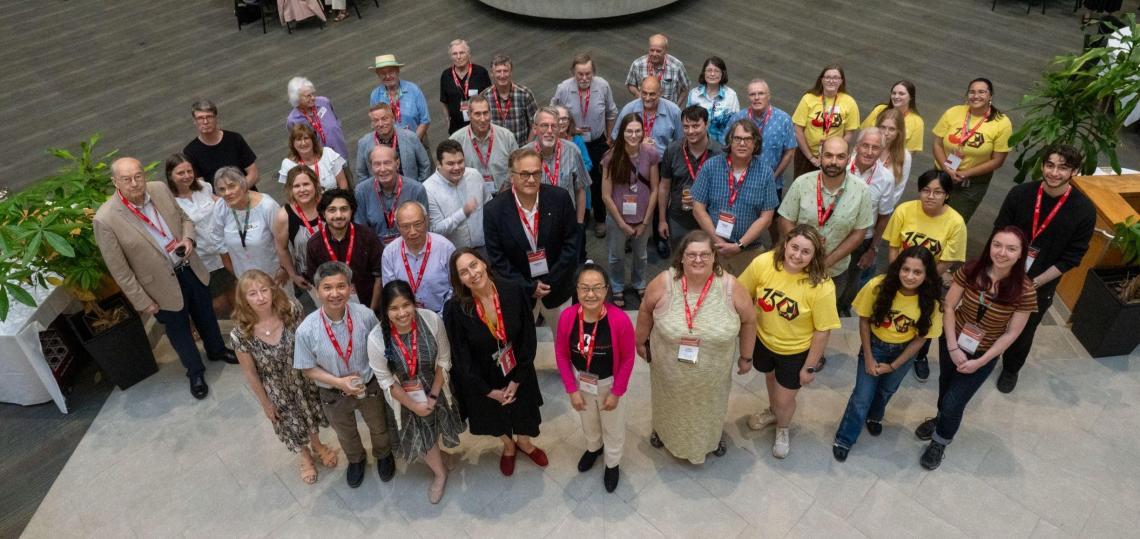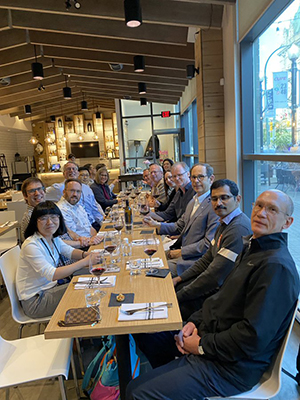Chem 150: 150 Years of Pioneering Chemistry

Celebrating breakthroughs in chemical research and education at U of G.
Since its foundation in 1874, the Department of Chemistry at the University of Guelph has been a pillar of scientific discovery. To commemorate its 150th anniversary in 2024, the Department organized a series of events and activities under the "Chem 150" banner, aimed at engaging students, faculty, staff, alumni and former faculty to honour the department's history and ongoing contributions to the field of chemistry.
Symposium in Winnipeg at the annual Canadian Chemistry Conference and Exhibition
A special symposium, Chemistry Through Time: 150 Years of Discovery in the Fields of Inorganic, Organic, Physical, and Biological Chemistry, was held during the annual Canadian Chemistry Conference and Exhibition (CSC 2024) in Winnipeg, Canada. The symposium was not only a celebration of scientific achievements, but also a testament to the department’s rich history and close-knit community with alumni and researcher reunions.
Dr. Rui Huang, assistant professor in the Department of Chemistry, helped organize the Symposium. She emphasized the importance of connecting past and present generations of Guelph chemists.
“The symposium aimed to create meaningful interactions that would lay the groundwork for future collaborations,” says Huang. “Beyond research talks, there were also networking sessions where alumni, faculty, and students could connect. Additionally, a new fellowship was established during the event, adding a special legacy to the celebration.”

Alumni Weekend
During Alumni Weekend at U of G, the Department hosted a special Alumni Dinner in Waasamowin, where alumni from various generations gathered to celebrate their shared history and achievements. A luncheon was also held for retired staff and faculty members, in addition to an Open House. Alumni and their families were invited to explore the department’s laboratories through guided tours, participate in hands-on activities, and enjoy interactive demonstrations. There was also liquid nitrogen ice cream and chemistry magic shows.
“Seeing the excitement on the faces of alumni and their families during the lab tours and chemistry magic shows reminded us of why we do what we do. Chemistry is not just a science; it’s a source of wonder,” says Dr. Aicheng Chen, professor in the Department of Chemistry.
Dedicated Issue in the Canadian Journal of Chemistry
A special issue in Canadian Journal of Chemistry featured articles from U of G researchers.
“This journal issue is a testament to the ongoing scholarly contributions of our faculty and alumni to the field,” says Dr. Kathryn Preuss, Department Chair. “It provides a permanent record of the innovative research that has defined Guelph chemistry.”
Collaboration and Industry Support
Industry partnerships and funding agencies were crucial in supporting the research presented at Chem 150. The department has a long history of successful collaborations with industry, which play a key role in translating academic research into real-world applications. Dr. Chen’s work in electrochemistry, for example, has benefited from extensive industrial support, ensuring that his innovations in environmental monitoring reach the market. Similarly, Dr. Richard Manderville’s research, funded by NSERC Alliance grants, exemplifies how academic-industry partnerships can drive impactful research.
Memorable Moments and Reflections
The symposium at the Canadian Society for Chemistry conference was filled with memorable moments, reflecting both the department’s history and its future direction. A keynote talk by Mark Lautens, U of G B.Sc. alum who received his honorary Doctor of Science from U of G in 2016, resonated deeply with attendees. Lautens shared his career journey, starting from his time as an undergraduate at U of G, underscoring how the department shaped his path to become a world-renowned leader and researcher in chemistry.
Looking to the Future
Faculty members are actively researching solutions in green chemistry, energy sustainability and advanced biomedicine. For example, Dr. Leanne Chen and Dr. Marcel Schlaf are exploring ways to convert biomass into energy. Dr. Huang, Dr. Derek O’Flaherty, and Dr. France-Isabelle Auzanneau are looking at developing nucleic acid therapeutics or cancer interventions. These research streams are not just advancing science but also providing solutions to real-world problems.
The department’s impact extends beyond its faculty and research. Alumni and trainees, many of whom now work in regulatory agencies, health organizations, and industry, apply the skills and knowledge gained at U of G to tackle critical issues. Whether through policy-making, industrial research, or academic leadership, the influence of the Department of Chemistry reaches far and wide.